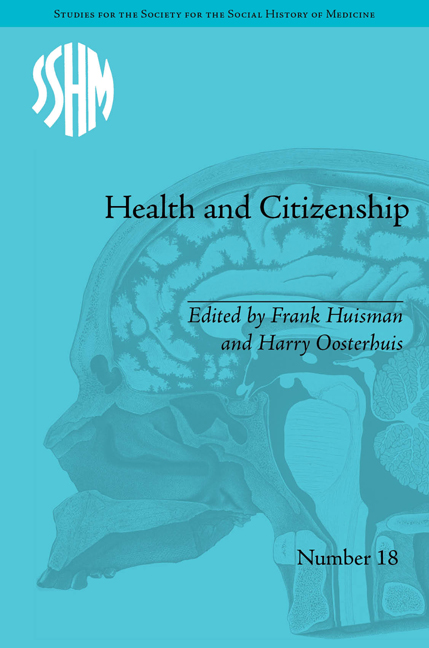Book contents
- Frontmatter
- CONTENTS
- Acknowledgements
- List of Contributors
- The Politics of Health and Citizenship: Historical and Contemporary Perspectives
- Part I Liberal Citizenship and Public Health
- 1 Before l'État-Providence: Health and Liberal Citizenship in Revolutionary and Post-Revolutionary France
- 2 An Oyster Odyssey: Science, State and Commerce in England, 1895–1905
- 3 Monopoly or Freedom of Healing? The Role of Medicine in a Modernizing Society
- 4 Ambivalences of Liberal Health Policy: Lebensreform and Self-Help Medicine in Belgium, 1890–1914
- Part II Social Citizenship: Health in the Welfare State
- Part III Neo-Republican Citizenship: Health in the Risk Society
- Notes
- Index
2 - An Oyster Odyssey: Science, State and Commerce in England, 1895–1905
from Part I - Liberal Citizenship and Public Health
- Frontmatter
- CONTENTS
- Acknowledgements
- List of Contributors
- The Politics of Health and Citizenship: Historical and Contemporary Perspectives
- Part I Liberal Citizenship and Public Health
- 1 Before l'État-Providence: Health and Liberal Citizenship in Revolutionary and Post-Revolutionary France
- 2 An Oyster Odyssey: Science, State and Commerce in England, 1895–1905
- 3 Monopoly or Freedom of Healing? The Role of Medicine in a Modernizing Society
- 4 Ambivalences of Liberal Health Policy: Lebensreform and Self-Help Medicine in Belgium, 1890–1914
- Part II Social Citizenship: Health in the Welfare State
- Part III Neo-Republican Citizenship: Health in the Risk Society
- Notes
- Index
Summary
The recognition of physical health as a right, but also as a responsibility, of citizens of a modernizing state shaped public health activity in England, as elsewhere in Europe, in the nineteenth century. Nonetheless, the implementation of public health policies did not go uncontested and the ways in which tensions between the desires of the state and the views of citizens were negotiated often proved influential in determining long-term state policies, as the case of anti-vaccinationism clearly demonstrates. Difficult enough in direct confrontation between state and citizen, such negotiations became yet more complex where commercial interests were involved. These problems were especially notable in relation to the food industries, where questions of state regulation, commercial responsibility and the health interests of the community were variously negotiated by individual industries over many decades from the late nineteenth century. One early example comes from the shellfish trades, which in the mid-1890s found themselves increasingly held responsible for the dissemination of typhoid in Britain. For a short time at the turn of the nineteenth century, classic liberal values of individual rights and freedom of economic interest clashed with state and medical concerns over public health, disease transmission and the welfare of the wider community. This case study shows that health policy and market interests were shaped not just by top-down government and political philosophy but also by events and actors on the ground, especially in a liberal political and economic context, such as existed in late nineteenth-century England.
- Type
- Chapter
- Information
- Health and CitizenshipPolitical Cultures of Health in Modern Europe, pp. 67 - 84Publisher: Pickering & ChattoFirst published in: 2014



